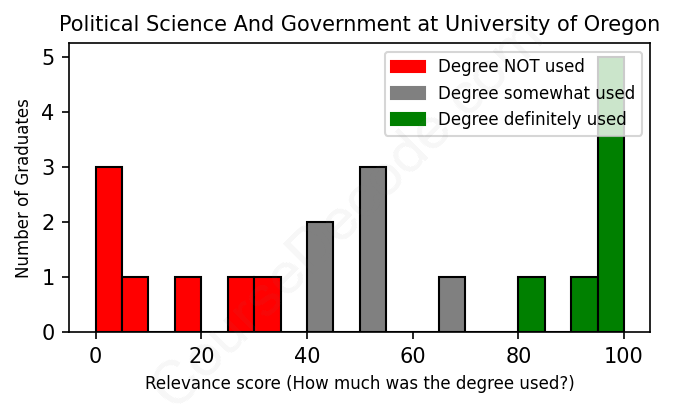
First, some facts. Of the Political Science And Government graduates from University of Oregon we've analyzed , here's how many have used (or NOT used) their degree in their career:

These are estimates based on AI analysis of 20 LinkedIn profiles (see below).
The verdict? Significantly below average. Overall, with an average relevance score of 53%, Political Science And Government graduates from University of Oregon have a much lower likelihood (-14%) of finding work in this field compared to the average graduate across all fields:
And for comparison, here's the chart for all profiles we've looked at across all degrees.
Also, after graduating, only 25% of these graduates have pursued further education other than another Bachelor's degree (such as a Masters degree or other), compared to the average across all profiles of 35%. This suggests a Bachelors degree is enough for most Political Science And Government graduates, and it's normal to look for work straight after graduation.
See the details:
|
Relevance score: 100% We think this person has gone into a career highly relevant to their degree. We think this person has gone into a career highly relevant to their degree.
DEGREE INFOGraduated in 2021 from University of Oregon with a Bachelor of Science - BS in Political Science And Government. No other secondary education since. JOB HISTORY SINCE GRADUATIONPre-litigation Paralegal/ Legal Assistant Thomas J. Henry Law Jun 2022 - Jul 2023 ABOUTUniversity of Oregon Graduate. Political Science major with a business minor. 3.71 cumulative GPA, and 3.8 Political Science GPA with focuses on Public Policy and Political Action, as well as Law and Justice. St. Mary's Law School class of 26 |
The top 10 most common jobs done by the graduates we've analyzed (ranked most common to least) are:
After looking through the variety of jobs that University of Oregon graduates with a degree in Political Science and Government have taken on, it seems like there's quite a mix. Many have gravitated towards roles in legal fields, political organizations, or government positions, which makes sense given the nature of their studies. Positions like Legislative Aide, Policy Analyst, and various Legal Assistant roles showcase how the skills and knowledge from their degree can be directly applied in practical settings. Additionally, jobs involving political campaigning or analysis, such as Field Organizers and Campaign Managers, highlight how graduates are actively engaging in organizations that contribute to political processes.
However, there are also a good number of graduates who have taken on careers that don’t quite connect back to their major at all. Many have ventured into roles in sales, construction, and even hospitality, where the direct application of political science skills seems minimal. For some, like recent graduates working as baristas or in technical roles, those jobs are far removed from the political realm. Overall, while there are meaningful and relevant positions that align closely with their Political Science education, a significant portion of these graduates seem to find themselves in jobs where their degree doesn’t play a vital role. This reveals a broader trend that sometimes degree holders end up in roles that may not directly relate to what they studied.”
Here is a visual representation of the most common words in job titles for Political Science And Government graduates (this is across all Political Science And Government graduates we've analyzed, not just those who went to University of Oregon):

Looking at the career paths of graduates from the University of Oregon with degrees in Political Science and Government, there's a mix of trajectories that make it pretty clear where many folks are headed after they finish school. For a lot of them, their first job tends to be in roles that are somewhat related to their degree—think positions in public service, internships at law firms, or starting as entry-level professionals in corporate environments. As they gain experience, especially around the 5 to 10-year mark, a noticeable number transition into more specialized roles like policy analysts, project managers, or even leadership positions. Others find their footing in completely different fields, such as sales or operations, which aren’t directly linked to political science but still leverage their skills in communication and critical thinking.
However, there are also quite a few examples of people who drifted away from politics or government-related jobs over time. Some have ended up in roles like customer service or administrative positions that aren't really tied to their studies, reflecting perhaps a more general trend of job searching that doesn’t always align perfectly with their academic focus. So, while you can definitely see some graduates making strides in fields like law, public policy, and risk management, there’s also a chunk who find themselves in gigs that might feel more like stops along the way rather than the end game. Overall, it’s a mixed bag; some make the most of their degree, while others venture into territories that diverge from their initial academic intentions.
Honestly, a Bachelor’s degree in Political Science and Government can be a mixed bag when it comes to difficulty, and the University of Oregon is no exception. Generally, it’s not considered the hardest major out there, but it definitely requires some serious critical thinking, reading, and writing skills. You’ll dive into a lot of complex theories and current events, which can be challenging but also really interesting if you're into politics. Some classes might feel like a breeze, especially if you have a passion for the subject, while others will definitely push you to engage with dense material and navigate debates. So, overall, it's probably about average in terms of difficulty—maybe a bit easier if you’re really into it!
Most commonly, in the LinkedIn profiles we've looked at, it takes people 4 years to finish a Bachelor degree in Political Science And Government.
Looking at these grads from the University of Oregon, it seems like they've had a pretty mixed bag when it comes to their earnings. A lot of the earlier graduates started in roles within the military or healthcare, which might not be the highest paying at first but can lead to decent salaries eventually, especially with their advanced skills. Some, like the ones who went into law or tech, are likely seeing better paychecks as they climb the ladder. The more recent grads seem to be in internships or entry-level positions, which definitely won't make them rich just yet, but if they keep hustling, they'll probably land better-paying gigs down the road. Overall, it seems like they’re on paths that could lead to good money, but they might be starting out a bit low, so it’s a work in progress!
Here is a visual representation of the most common words seen in the "about" section of LinkedIn profiles who have a Bachelor degree in Political Science And Government (this is across all Political Science And Government graduates we've analyzed, not just those who went to University of Oregon). This may or may not be useful:

Here are all colleges offering a Bachelor degree in Political Science And Government (ordered by the average relevance score of their Political Science And Government graduates, best to worst) where we have analyzed at least 10 of their graduates: